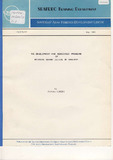The Development and Associated Problems Intensive Shrimp Culture in Thailand
抄録
In the past half-decade, the has industrialization of Thailand the progressed rapidly; one of the main contributory factors has been quick growth in foreign investment. As a result of this investment, Thailand has developed its secondary and tertiary industries substantially, while, the importance of primary industry has remained unchanged. The consequent further concentration of population in the capital city Bangkok, has already caused a decrease in the quality of life for its inhabitants. For poor class Thais, the living conditions in Bangkok, public transportation, air pollution housing circumstances etc. are worse than up-country. The people who have come to Bangkok to work from up-country have serious complaints, but they cannot find Jobs in their home towns.
For the time being industrialization around the metropolitan area is expected to continue. The Board of Investment of the Thai government is trying to develop rural area, and gives privileges to foreign investors if they establish new projects up-country, but the infrastructure in these areas is still poor, and foreign investors are therefore often reluctant to initiate Industrial projects in these areas. In the longer term however, this negative factor will be improved and new investment will probably spread all over the country.
Intensive shrimp culture is an option for economic development in rural areas, and is an industry that does not require foreign capital and technology for its development. In addition, intensive shrimp culture is a relatively high profit business compared to other sectors and frozen shrimp is already one of Thailand's major exports. A frozen shrimp factory also contributes to higher employment levels in its area because it requires quite a number of unskilled female workers.
Same of the nation's leading companies are eager to expand their profit from the shrimp culture business. One particular influential agro company in Thailand is becoming dominant in this sector. The company takes part in all aspects of the shrimp business; production of artificial bait huge scale intensive shrimp culture, extension services to the individual farmers collection of reared shrimp, the operation of freezing factories and exporting. There is the fear for the individual farmers that the price of cultured shrimp could be manipulated by these companies. On the other hand, the technology to produce the high quality bait and technical service which they provide are a contributory factor in the farmers' success.
Family operated farming is less expensive than big company operations, and this economic factor will be the most important factor in the future because production in other Asian countries is increasing and their prices are becoming very competitive. Thai farmers are therefore required to produce shrimp at least cost. Under these circumstances, family operated individual farms have advantages over company operated farms.
However, the farmers need to learn more appropriate methods of operation. It they improve the culture system is essential that that repeated use does not decrease the soil quality of the ponds nor effect the environment with polluted effluent If they can implement such good practices, Thai shrimp farmers will be able to survive among competitive world shrimp producers in the future.
Citation
Kikuchi, A. (1993). The Development and Associated Problems Intensive Shrimp Culture in Thailand. Training Department, Southeast Asian Fisheries Development Center.

